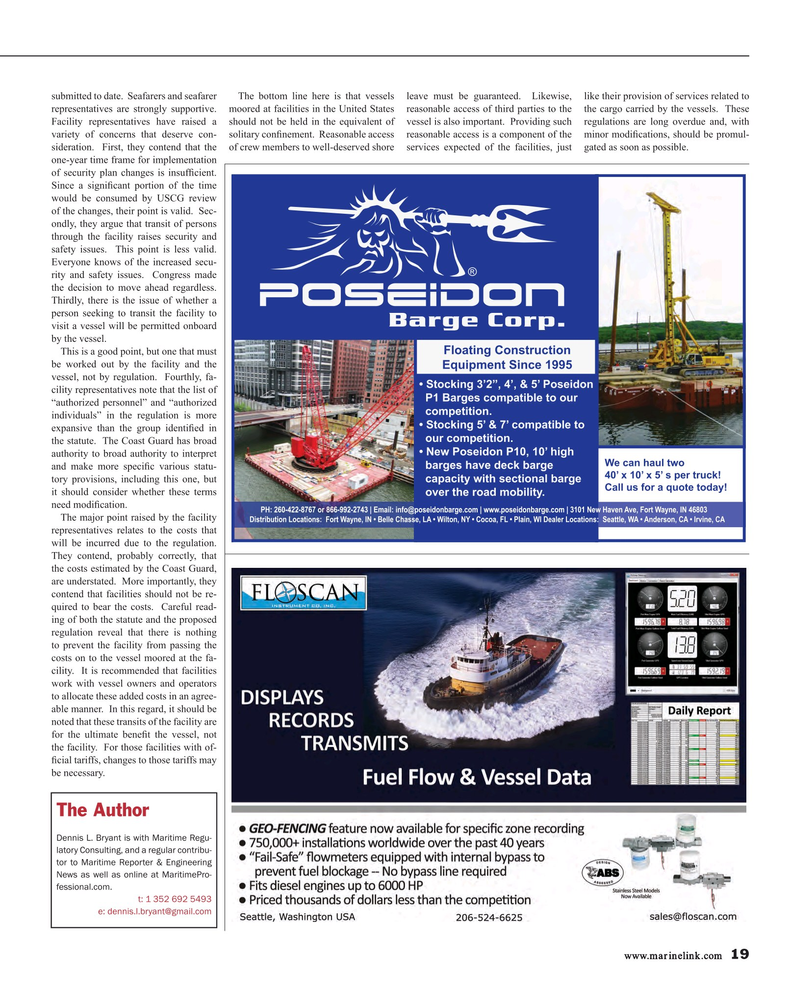
Page 19: of Maritime Reporter Magazine (July 2015)
Marine Communications Edition
Read this page in Pdf, Flash or Html5 edition of July 2015 Maritime Reporter Magazine
submitted to date. Seafarers and seafarer The bottom line here is that vessels leave must be guaranteed. Likewise, like their provision of services related to representatives are strongly supportive. moored at facilities in the United States reasonable access of third parties to the the cargo carried by the vessels. These
Facility representatives have raised a should not be held in the equivalent of vessel is also important. Providing such regulations are long overdue and, with variety of concerns that deserve con- solitary con? nement. Reasonable access reasonable access is a component of the minor modi? cations, should be promul- sideration. First, they contend that the of crew members to well-deserved shore services expected of the facilities, just gated as soon as possible.
one-year time frame for implementation of security plan changes is insuf? cient.
Since a signi? cant portion of the time would be consumed by USCG review of the changes, their point is valid. Sec- ondly, they argue that transit of persons through the facility raises security and safety issues. This point is less valid.
Everyone knows of the increased secu- rity and safety issues. Congress made the decision to move ahead regardless.
Thirdly, there is the issue of whether a person seeking to transit the facility to visit a vessel will be permitted onboard by the vessel.
This is a good point, but one that must be worked out by the facility and the vessel, not by regulation. Fourthly, fa- cility representatives note that the list of “authorized personnel” and “authorized individuals” in the regulation is more expansive than the group identi? ed in the statute. The Coast Guard has broad authority to broad authority to interpret and make more speci? c various statu- tory provisions, including this one, but it should consider whether these terms need modi? cation.
The major point raised by the facility representatives relates to the costs that will be incurred due to the regulation.
They contend, probably correctly, that the costs estimated by the Coast Guard, are understated. More importantly, they contend that facilities should not be re- quired to bear the costs. Careful read- ing of both the statute and the proposed regulation reveal that there is nothing to prevent the facility from passing the costs on to the vessel moored at the fa- cility. It is recommended that facilities work with vessel owners and operators to allocate these added costs in an agree- able manner. In this regard, it should be noted that these transits of the facility are for the ultimate bene? t the vessel, not the facility. For those facilities with of- ? cial tariffs, changes to those tariffs may be necessary.
The Author
Dennis L. Bryant is with Maritime Regu- latory Consulting, and a regular contribu- tor to Maritime Reporter & Engineering
News as well as online at MaritimePro- fessional.com. t: 1 352 692 5493 e: [email protected] www.marinelink.com 19
MR #7 (18-25).indd 19 MR #7 (18-25).indd 19 7/8/2015 9:46:03 AM7/8/2015 9:46:03 AM

 18
18

 20
20
